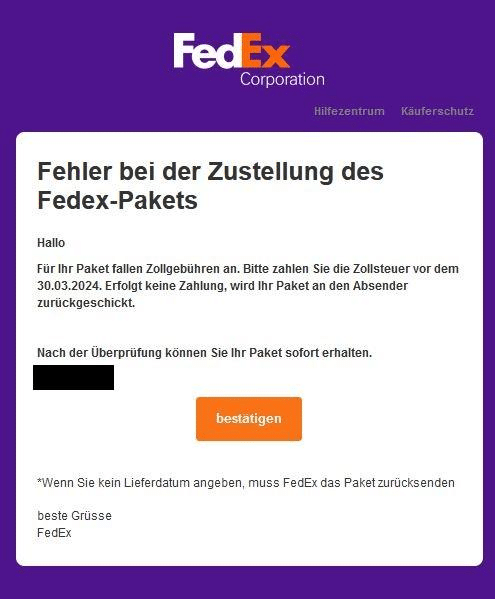Sending and receiving packages has become part of everyday life, so scammers have developed new methods to take advantage of unsuspecting recipients. One of these methods is phishing, which involves sending fake emails on behalf of well-known logistics companies such as FedEx. These emails pretend that a package is subject to customs fees and urge the recipient to click on a link to pay the fees or get more information. But caution is advised: These requests hide attempts at fraud that aim to steal personal data or spread malware.
The “FedEx” customs fee scam
The scam usually begins with an email informing the recipient that their package will be subject to customs fees. The message contains a button that says “Confirm,” which supposedly checks the status of the package and allows the package to be received. The recipient is warned that the package will be returned if no delivery date is specified. This pressure is intended to entice the recipient to act hastily and click on the link.

Recognize warning signs
Several features of these phishing emails serve as warning signals to recipients. An impersonal salutation, spelling errors in the company name (e.g. a lowercase “e” in FedEx) and an unusual farewell phrase such as “with kind regards” are indicators that should arouse suspicion. A crucial identifying feature is the sender address, which usually does not match the company's actual domain.
Protective measures
To protect yourself from such phishing attempts, experts recommend not clicking on links in suspicious emails and not revealing any personal information. Instead, you should search for information directly on the provider's official website or contact customer service. Additionally, it is advisable to immediately mark such emails as spam and delete them to minimize future fraud attempts.
Questions and answers:
Question 1: How do I recognize phishing attempts on behalf of logistics companies?
Answer 1: Look out for impersonal salutations, spelling mistakes, unusual farewell phrases and check whether the sender address matches the company's official domain.
Question 2: What should I do if I receive a suspicious email?
Answer 2: Do not click on links, do not reveal personal information, search for information directly on the official website, and mark the email as spam.
Question 3: Why do scammers use the tactic of faking customs duties?
Answer 3: The aim is to put pressure on the recipient and get them to prematurely click on links or reveal personal information.
Question 4: How can I effectively protect myself against phishing?
Answer 4: Be wary of emails from unknown senders, check the sender address and keep your security software up to date.
Question 5: What happens if I click on a link in a phishing email?
Answer 5: You risk exposing personal information or installing malware on your device.
Conclusion
Phishing on behalf of FedEx under the guise of customs duties is a sophisticated fraud method to obtain personal information or distribute malware. Detecting such fraud attempts requires attention and caution on the part of recipients. By recognizing the typical characteristics of phishing emails and taking protective measures, Internet users can effectively protect themselves from these threats. It is important to always be vigilant and, if in doubt, to resort to direct communication with the service provider.
Source: consumer center.de
The key to digital security is staying informed and treating unexpected emails with skepticism. Stay safe and don't forget to subscribe to the Mimikama newsletter at https://www.mimikama.org/mimikama-newsletter/ and our online lectures and workshops at https://www.mimikama.education/online-vortrag -by-mimikama/ to visit.
You might also be interested in:
Notes:
1) This content reflects the current state of affairs at the time of publication. The reproduction of individual images, screenshots, embeds or video sequences serves to discuss the topic. 2) Individual contributions were created through the use of machine assistance and were carefully checked by the Mimikama editorial team before publication. ( Reason )

